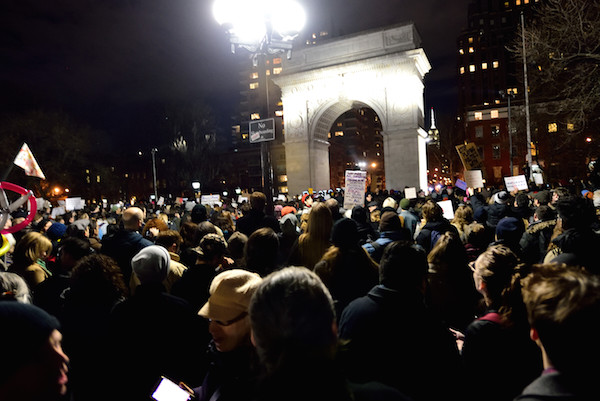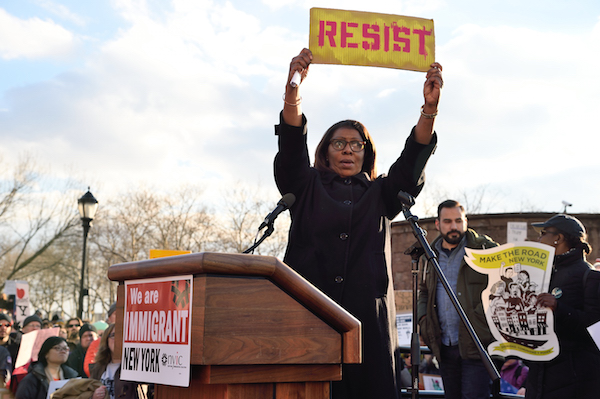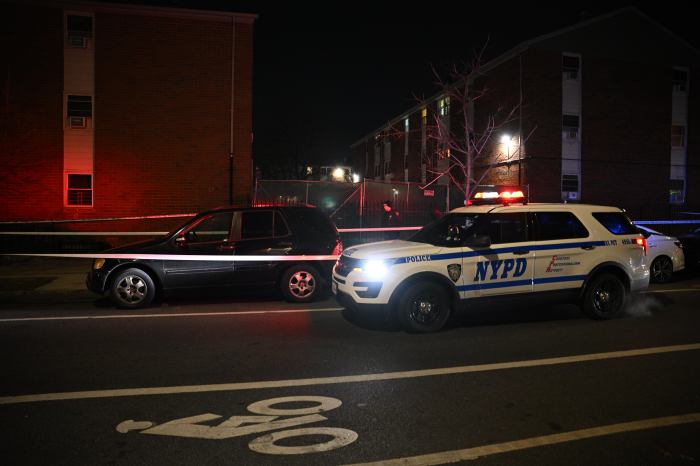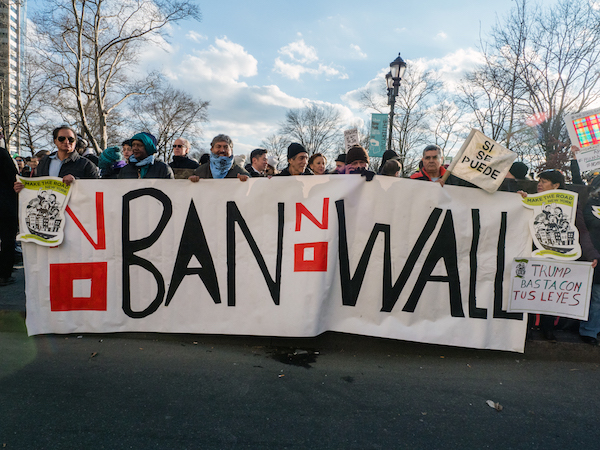
BY CHELSEA NOW STAFF | President Donald Trump’s draconian — though ineptly crafted and implemented — executive order on immigration and refugee entry into the US created a spontaneous eruption of protests nationwide and brought thousands of New Yorkers into the streets and to the airport nearly every day since Thurs., Jan. 26.
The evening before Trump announced his order, issued on Jan. 27, International Holocaust Remembrance Day — which he bizarrely acknowledged without any mention of its six million Jewish victims — thousands gathered in Washington Square in a rally hastily called by the Council on American-Islamic Relations.
Out gay Chelsea City Councilmember Corey Johnson — whose father, the child of a Korean woman and a US GI, was adopted at age three in Seoul and brought to the US, and whose maternal great-grandparents came here from Ireland — told the crowd, “We in New York City are going to be the face of resistance. Forty percent of New Yorkers are foreign born. Why are we the greatest city in the world? Because of our people.”
Of the president, Johnson said, “We have a leader who is not just a demagogue, but a pathological liar with no impulse control, and the facts mean nothing to him.”
Though immigration rights advocates were clearly prepared for the worst, the breadth and arbitrariness of Trump’s order the following day shocked many. All refugee entry is barred for 120 days, and entry by Syrian refugees is suspended indefinitely. Most immigration is also suspended for 90 days from seven Muslim-majority nations — Iran, Iraq, Libya, Somalia, Sudan, Syria, and Yemen.
The libertarian (and generally conservative) Cato Institute immediately took note of the fact that between 1975 and 2015, not a single American was killed on US soil as the result of terrorist attacks by nationals from any of the seven countries. Other observers pointed out that Trump’s family business has no dealings in those nations but does in other Muslim nations, such as Saudi Arabia, where 15 of the 19 9/11 attackers came from.
As customs officials began enforcing the president’s order, which had not been vetted by officials in the Departments of Homeland Security, Justice, Defense, or State, Americans spontaneously flocked in large numbers to major airports around the nation in protest.
The demonstrators who gathered outside Terminal 4 at Kennedy Airport were a strikingly diverse group made up of some home-grown New Yorkers and others from far-flung parts of the world.

One shocked bi-national couple turned out in support of those who were stopped at the airport and threatened with being sent back to their native lands.
“It’s absolutely nerve-wracking because we are working on staying here,” said Camila Quinteros-Stein, 26, from Peru. “We are married and we are working on our green card, so I was like, ‘Wait, I just submitted some paperwork, what do I do now?’ ”
Phoebe Quinteros-Stein, who is originally from New Jersey and married to Camila, said: “As the American in the relationship, I am pretty ashamed.”
Camila was not surprised by what has happened in America since coming back to the US, particularly in light of a history of military coups in Latin America.
“I don’t think this is the end of democracy,” she said. “I think it is a wake-up call for a lot of Democrats and liberals to not accept that our conversation should be amongst ourselves… and to actually speak to people outside of our bubbles.”
The outpouring of love for the refugees overwhelmed one Muslim man.
“I’m from New York, born and raised in Queens, and I live in Westchester,” said Adil Iqbal, a 33-year-old doctor.
When he learned of the president’s order, he said he knew he had to stand in solidarity for all people.
“I’m grateful that I’m in New York City, the most tolerant place in the world. Islam is about peace, and I think the media has created a huge misconception on who Muslims are across the world,” Iqbal said. “This is the fruit of that. For a decade and a half the media been injecting fear toward Islam, and they have gotten this idiot Trump elected.”
City Councilmember Carlos Menchaca, an out gay Brooklynite who represents Sunset Park, Red Hook, and Windsor Terrace, said, “It was heart-wrenching to spend time with families at JFK Airport Terminal 4 who were waiting for their mothers and wives to be released.”
He added, however, “I was able to bring some sense of community and hope to one family when I showed them photos and video of thousands of people gathering outside in solidarity. For a moment, their hearts lifted knowing they were not alone.”
Kui Tan, 24, a Chinese American originally from Iowa and now living in New York, recalled past discrimination against Asian immigrants.
“This is totally immoral, unconstitutional, and a lot of things have been happening with the executive orders, but this is the first time that people’s lives are affected, international relations are shot, and this is like Japanese internment,” she said. “When it’s convenient to discriminate, they are not going to care.”
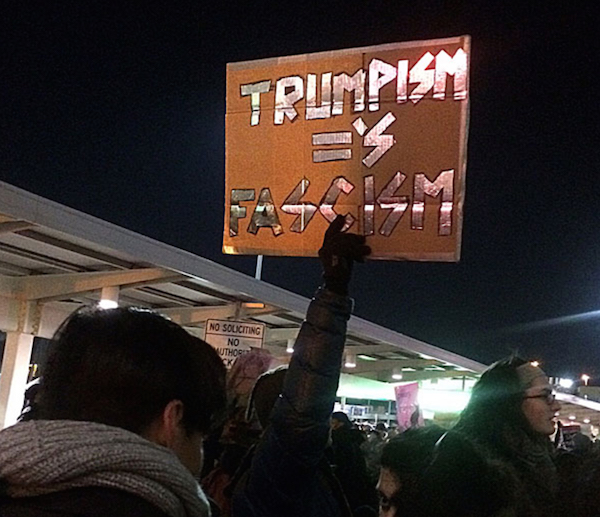
Chtindarpal Singh, a South Ozone Park resident who came to New York from India, reflected on the importance of Americans uniting in the face of anti-immigrant sentiment.
“To be honest, I feel really loved,” said Singh, who is often mistaken for Muslim. “I know it’s kind of crazy, but what you see [here] is love for Muslims. I’m Sikh, a different religion, but I feel like New York has got our back and I love it. There is always a mix-up between Sikh and Islam, but any hate is bad. I’m not going to say, ‘No, I’m not Muslim.’ There shouldn’t be any hate at all.”
Even as thousands held vigil at Kennedy, news of an emergency federal court hearing on Trump’s order in Brooklyn on Saturday evening spread quickly on social media, and demonstrators high-tailed it to Cadman Plaza East near the Brooklyn Bridge. By the time the court’s decision came down at 9 p.m., a large crowd erupted in singing, chanting, and cheering alongside a live brass band.
“It was a party feeling,” said Marika Plater, who lives in the Clinton Hill section of Brooklyn. “It’s really nice to see this response to all the anger that’s out there right now.”
Inside, Judge Ann Donnelly had to shush whoops as she granted a temporary stay regarding a portion of Trump’s order, finding that returning some of those detained — already holding visas, green cards, or refugee status — could subject them to “irreparable harm.”
“If they had come in two days ago, we wouldn’t be here,” said Donnelly.
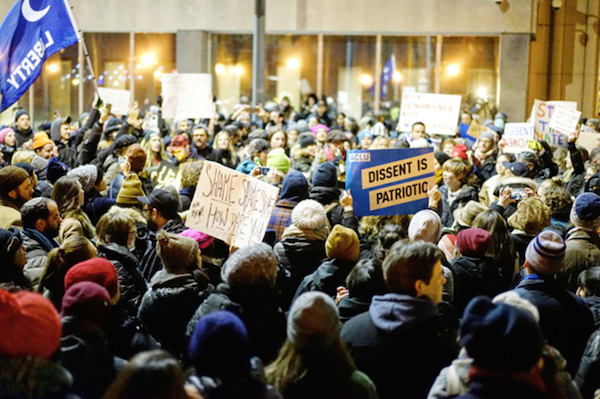
Somewhere between 100 and 200 people — even government lawyers claimed they didn’t know exactly — were being held at airports around America on Saturday, including dozens at Kennedy. Though some detainees were allowed to enter the country, Donnelly’s decision doesn’t necessarily mean all will be freed, lawyers warned — they could be held in detention until the case is actually heard on Feb. 21.
“That’s a lot of time to be sitting in a detention center,” said Anthony Romero, head of the American Civil liberties Union, which filed the lawsuit.
The attorneys who successfully intervened won widespread praise, as did the thousands who turned out in support of those struggling to enter the country.
“This is just so beautiful, I am just so proud,” said Congressmember Nydia Velázquez, a Democrat who spent the whole day at Kennedy Airport with her colleague, Jerry Nadler, who represents Manhattan’s West Side and portions of Brooklyn. Velázquez, whose district spans many immigrant neighborhoods in Manhattan, Brooklyn, and Queens, added, “Now we have to bring justice to all the refugees who are escaping violence in their countries to be here — this is who we are.”
The energy expended on Saturday did not dissipate passion about the issue, and on Sunday, an estimated 10,000 gathered in Battery Park, with America’s most enduring symbol of immigration as a backdrop. Many of the protesters sported foam Statue of Liberty hats they bought from vendors, and at least one demonstrator’s sign quoted Emma Lazarus’ famous poem inscribed on the statue’s pedestal: “Give me your tired, your poor, your huddled masses… Send these, the homeless, tempest-tost to me.”
The crowd chanted, “No hate, no fear, refugees are welcome here!” and “No ban, no wall!” — a message many bore on signs and banners.
Numerous Democratic elected officials attended the rally — including Mayor Bill de Blasio, Senators Charles Schumer and Kirsten Gillibrand of New York and their New Jersey colleague, Cory Booker, Velázquez and Nadler, along with their fellow House members Carolyn Maloney, Adriano Espaillat, Hakeem Jeffries, and Joe Crowley.
Schumer vowed that he would “not rest until these horrible orders are repealed,” and credited Saturday’s protests at Kennedy with helping to ease restrictions and allow dozens of people being held there to enter the country. But he warned the work was not over.
“We have made progress for 42 [visa holders],” Schumer said, “but we have to make progress for thousands, and tens of thousands more, and hundreds of thousands more.”
Schumer, who as Senate minority leader is the most powerful political opponent Trump has in Washington, received a lukewarm welcome from the crowd, in part because he has supported some of the president’s less controversial cabinet nominees. Some demonstrators chanted “oppose the nominees” following his speech.
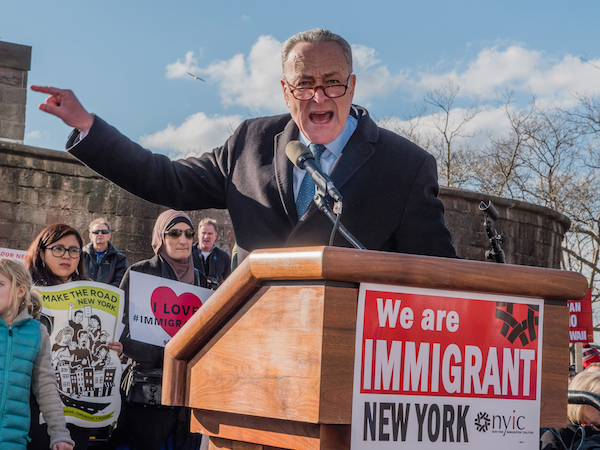
Later on Sunday, Maloney asked a House committee to investigate “how the executive order banning and restricting immigration signed on Friday came to fruition,” according to a press release from her office. She wants to know what federal agencies the Trump administration consulted in preparing the order.
Throughout the week, activism and street protests have continued in New York regarding the Trump order. On Wednesday evening, the Syria Solidarity New York City and CISPOS: Committee in Solidarity with the People of Syria co-sponsored a rally in Foley Square, the site of the federal courthouse in Manhattan.
––Reporting by Lincoln Anderson, Ruth Brown, Lauren Gill, Dennis Lynch, Naeisha Rose, and Paul Schindler.
